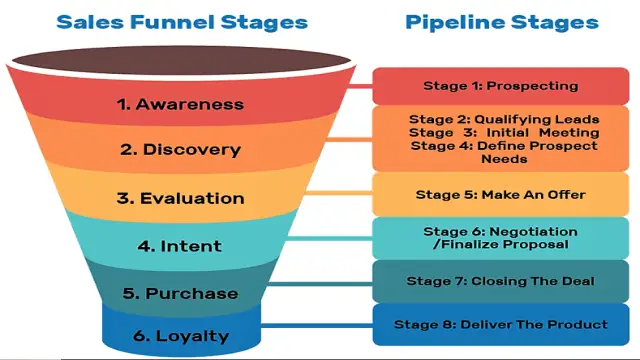Creating a Healthy Sales Funnel: A Step-by-Step Guide to Boost Your Sales
Lets be honest building a sales funnel can feel like herding cats. Its a bit tedious, requires patience, and demands a strategic approach. But here’s the thing: a well-crafted sales funnel can transform your business. The key? Don’t treat your online visitors like customers right away. Instead, focus on engaging them, hooking their interest, and guiding them step-by-step toward a buying decision. Sounds simple, right? Well, it’s not rocket science, but it does require a clear plan. Let’s break it down.
What Is a Sales Funnel and Why Does It Matter?
A sales funnel is like a roadmap for your customers. It’s the journey they take from discovering your product to making a purchase. The term “funnel” is used because, at each stage, some potential buyers drop off. Your goal? Keep as many people as possible moving through the funnel until they reach the end the sale.
But why bother with a sales funnel? Here’s why:
- It builds trust: By engaging users gradually, you establish credibility.
- It increases conversions: A structured approach leads to more sales.
- It identifies weak spots: You can see where prospects drop off and fix the issue.
Think of it this way: Would you propose on the first date? Probably not. Similarly, don’t throw a sales pitch at your visitors right away. Instead, guide them gently toward the decision to buy.
The 5 Key Stages of a Successful Sales Funnel
Creating a sales funnel isn’t about luck—it’s about strategy. Here are the five essential stages to build a funnel that works:
1. The News: Hook Their Attention
Every great sales funnel starts with a hook. This is where you introduce a problem or a need that your product can solve. For example, if you’re selling holiday-themed candles, your “news” could be about the upcoming Christmas season and how it’s the perfect time to create a cozy atmosphere.
Key Tip: Don’t mention your product yet. Just focus on grabbing their attention and making them curious.
2. The Tease: Build Anticipation
Once you’ve hooked them, it’s time to tease. This is where you hint at what’s coming next without giving everything away. For instance, you could say, “Stay tuned for a special offer that will light up your holidays like never before.”
The goal here is to create excitement and keep them engaged. Think of it as the trailer for a movie—it should leave them wanting more.
3. The Gift: Offer Value
Now that you’ve got their attention, it’s time to give them something valuable. This could be a free sample, a discount code, or a helpful tool. The idea is to build goodwill and show that you’re not just after their money.
Pro Tip: The more valuable the gift, the more likely they are to trust you and move to the next stage.
4. The Offer: Present Your Product
This is where you finally introduce your product. Highlight its features, benefits, and pricing. Be clear and concise, but don’t overwhelm them with too much information.
For example, if you’re selling those holiday candles, explain how they’re handmade, eco-friendly, and perfect for creating a festive vibe.
5. The Pull: Create Urgency
The final stage is all about creating urgency. Use scarcity tactics like limited-time offers or exclusive bonuses to push prospects toward a decision. For instance, “Order now and get a free gift wrapping service—only until Christmas Eve!”
This stage is crucial because it turns interest into action.
How to Make Your Sales Funnel Even Stronger
Now that you know the basics, let’s talk about how to optimize your funnel for maximum results.
1. Use Email Marketing
Email is one of the most effective ways to nurture leads. Send teaser emails, share valuable content, and remind subscribers about your offers.
Pro Tip: Keep your emails short, engaging, and focused on the reader’s needs.
2. Leverage Social Media
Promote your funnel on platforms like Facebook, Instagram, and Twitter. Use hashtags, run ads, and participate in relevant conversations to reach a wider audience.
3. Offer Freebies and Bonuses
People love free stuff. Whether it’s a free eBook, a trial, or a discount, offering something for free can significantly boost engagement.
4. Write from the Reader’s Perspective
Your content should feel like a conversation, not a sales pitch. Use “you” language to make readers feel like you’re speaking directly to them.
5. Analyze and Improve
Track your funnel’s performance to see where prospects drop off. Use this data to make improvements and optimize each stage.
Common Mistakes to Avoid
Even the best sales funnels can fail if you make these mistakes:
- Being too pushy: Don’t rush the process. Let prospects move at their own pace.
- Overloading with information: Keep your messages clear and concise.
- Ignoring data: Use analytics to track performance and make adjustments.
Final Thoughts: Patience Pays Off
Building a sales funnel isn’t a one-time task—it’s an ongoing process. It requires patience, testing, and tweaking. But when done right, it can turn casual visitors into loyal customers.
So, what are you waiting for? Start building your sales funnel today and watch your business grow. Remember, the key is to engage, not sell. Hook your readers, offer value, and guide them gently toward the decision to buy.

